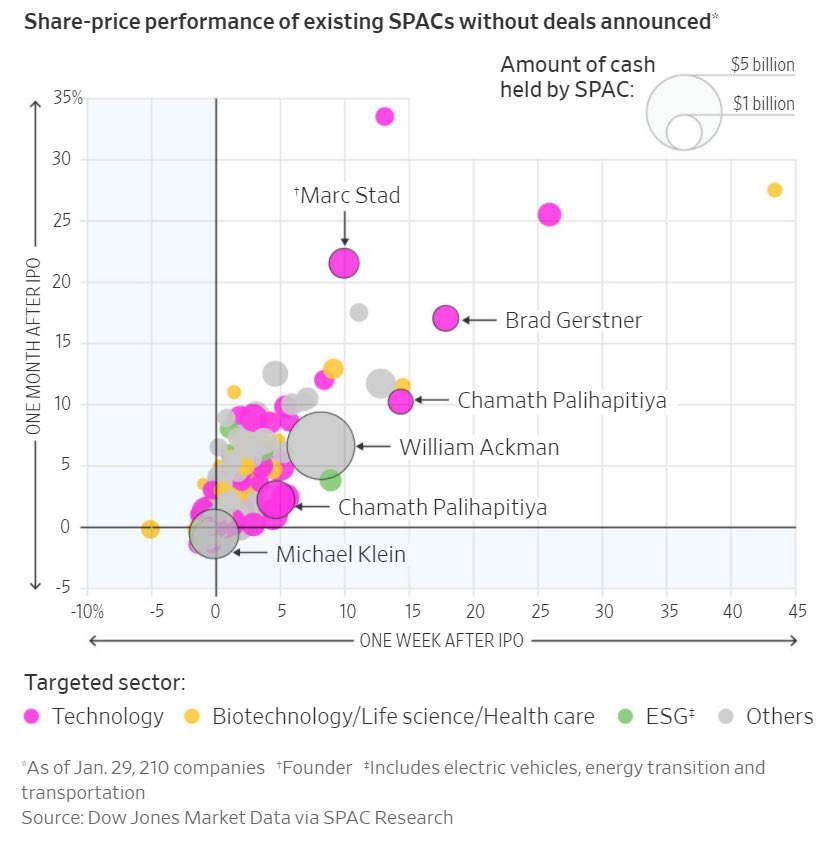Crumbs
- Steve Mnuchin is looking for live gigs. And Zoom ones. He’s a bargain compared to Janet Yellen. But, maybe he can afford to be generous with his time.

- SPAC mania continues.
News
Kim Kardardashian has filed for divorce. I’m not sure who she is, but Twitter seems interested.
Bitcoin hits more all time highs.
Wrap
Basically, inflationary. Every govt. bond market except China has increasing yields. (Norway was flat.) DX is weak: down to 90.355. USD is going down, even against the JPY. I am still inclined to think that the time has come for Japan & co. to reflate, but maybe not yet. US equities down, European up. Commodity markets (MOEX, TSX) up quite a bit. Commodities mixed. Copper still strong, energy down, precious metals up, ag. commodities mixed.
Reflections: the problem of “free money”
Milton Friedman said, in 2004:
There are four ways in which you can spend money. You can spend your own money on yourself. When you do that, why then you really watch out what you’re doing, and you try to get the most for your money. Then you can spend your own money on somebody else. For example, I buy a birthday present for someone. Well, then I’m not so careful about the content of the present, but I’m very careful about the cost. Then, I can spend somebody else’s money on myself. And if I spend somebody else’s money on myself, then I’m sure going to have a good lunch! Finally, I can spend somebody else’s money on somebody else. And if I spend somebody else’s money on somebody else, I’m not concerned about how much it is, and I’m not concerned about what I get. And that’s government. And that’s close to 40% of our national income.
In the UK now, government is spending around 60% of our national income. I’ve read that this is a higher proportion of GDP than was ever managed in the old Soviet economy, but I don’t have the reference, but it’s certainly a lot of government.
Milton wasn’t quite right, in the sense that if I am a politician spending somebody else’s money on somebody else, I am concerned about how much I spend, and how much I get because eventually the voters will notice that a lot of money is taken out of their wallets as tax and they don’t get much back in the form of public services. Of course, this only matters when governments are elected by a democratic process.
But even this is a simplification, because in a modern democracy one tier of government through which all democratic choices are exercised is not a practical proposition. In the UK now we have (ignoring devolved administrations in Scotland and Wales) the possibility of democratic elections at national, county, district and parish tiers. If each tier raised exactly what it spent from its own voters, this would not be so much of a problem. But this can’t happen, because then we’d have a ‘postcode lottery’ in which some citizens received better public services than others. The fact that they may have less money, or be less willing to spend similar sums is ignored. This results in transfers from some areas to others: something which is impossible to avoid in a democracy.
The side effect of this is that the link between local spending and local taxation is severed, and with it the natural brake on the frugality of local councils. This explains why councils are rewarded for bad decisions by receiving subsidies from voters in better run areas of the country, and entrenched administrations.
As always, it’s a lot easier to state the problem than to solve it, especially when the electoral effects of taking away “free stuff” can be devastatingly damaging. So we muddle on, hoping that something will turn up. Poor old Milton must be spinning in his grave.
Chart
The European Union Labour Force Participation is still under 58%. The UK had levels which were in the 90’s, for men. How can there be any doubt that no amount of fiscal stimulus will raise inflation with such low levels of participatio?
source: tradingeconomics.com
Comments !